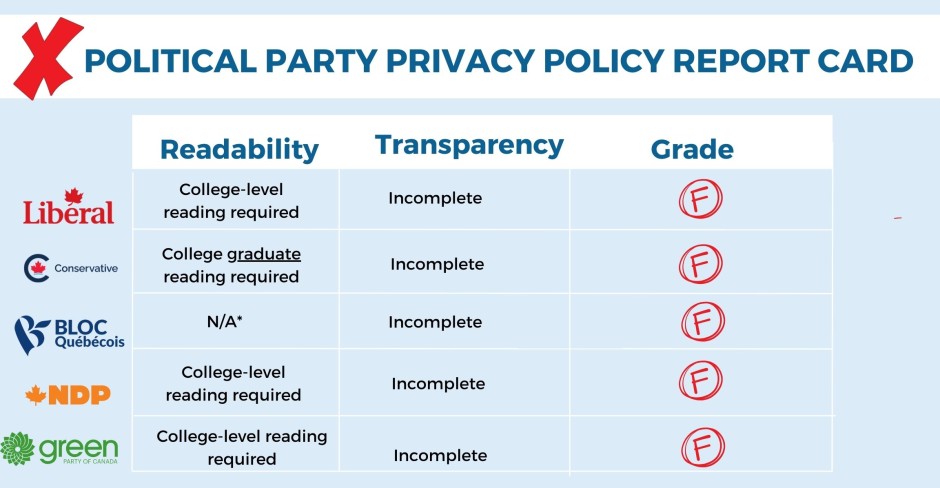Federal Political Parties: Flunking the Privacy Law Test
Laws are sort of like a high school exam. There are rules, expectations, and results. Did you meet the goals? Did you do something wrong? Did you try to get one past the teacher and sneak in some notes?
Laws are sort of like a high school exam. There are rules, expectations, and results. Did you meet the goals? Did you do something wrong? Did you try to get one past the teacher and sneak in some notes?
If the federal Liberal, Conservative, NDP, Bloc, and Green parties wrote the Privacy Law Exam today (so to speak), they would all have to repeat the class. And maybe even pay fines or be held accountable for their poor performance.
All parties’ policies completely miss the mark and violate both federal and provincial privacy law in Canada. Parties are free to collect any personal information they like about voters, however they like, and share it with whichever outside companies they like. And the policies are all written so that only college graduate-level readers are likely to fully understand them.
Worse, no one is overseeing the parties to ensure they’re sticking to their policies. No Office of the Privacy Commissioner here, folks. It's like they’ve fired the teacher and Canadians just have to trust when parties give themselves an A.
How is that even allowed?! Well, the parties made sure they wouldn’t have to follow the rules when they passed Bill C-47 in June of 2023. C-47 had a tiny section at clause #680 declared that the only privacy laws parties have to follow are their own privacy policies – that they write themselves! Imagine getting to write your own laws!
Federal political parties now exist in a privacy limbo. We need to make sure that they are covered by some privacy law, and it’s urgent. What the parties have in place now leaves everyone’s personal information at risk.
When looking at the parties’ policies for how much they follow existing federal and provincial privacy laws and readability, they turn up failing grades on all fronts.
Do the policies follow Canadian privacy laws?
Absolutely not! Of the 10 privacy principles that the Office of the Privacy Commission recommended that parties follow, they outright fail 6 based just on the wording of their privacy policies! That’s a failing grade.
They fail privacy law at the most important part: getting informed consent. The parties have instead opted out of giving you the whole story. They do this by using what’s called “open lists” when describing what kind of personal information they collect, how they get it, and who they can share it with. So, while they say they collect personal information including your telephone number, address, and name, they actually mean “including these things but also anything else we want to collect.” Provincial parties have even been found to collect sensitive information, like people’s ethnicity and religion without their consent!
Political parties also seem to treat any personal information you put up on social media as fair game to collect. Under privacy laws, that would usually be a violation of individuals’ privacy for anyone else - corporations or government.
Readability
Privacy doesn’t have to be confusing, but sometimes it’s in a company or political party’s interest to make sure readers are a bit unclear on what they’re agreeing to. If you don’t know what a policy says, you might not notice that it says a party can collect any information about you that it likes! And that’s just what all the parties’ policies do.
Using Flesch-Kincaid Reading Ease scoring system, we found that all political parties’ privacy policies required at least college-level reading skills. The Conservative privacy policy even came in at college graduate-level!
To be readable by all eligible voters in Canada, political parties should aim for a score of about 60 - about a 12th grade level. The score of this blog post is 55. The lower the score, the harder the piece is to read. The higher, the easier.
All parties came in with a score between 24-35. That’s between a college and college graduate level. This is inaccessible to nearly half of Canadians. That means all parties get a failing grade for readability.
The results, with most-readable first:
Liberals (tie): 35
Green (tie): 35
NDP: 31
Conservatives: 24
*The scoring method works best in the English language. The Bloc was the only party that didn’t have its policy available in both official languages, so their score was left out.
Federal political parties need to follow privacy laws!
With the use of personal information by third parties during elections causing trouble in other countries, and AI set to make use of personal data more sensitive than ever, Canada has to be certain that its parties are held to privacy laws. Our federal political parties shouldn’t be above the law when it comes to respecting your privacy.
British Columbia’s Office of the Information Privacy Commissioner found that the province’s law applies to federal political parties. BUT - that decision is being challenged by the parties in hopes that they can stay untouched by privacy laws, and even if the OIPC is successful, it will not protect voters in the rest of Canada.
The endgame needs to be the making sure that federal privacy laws like PIPEDA apply to parties. To view my full report, click here.
OpenMedia has an open action calling for the government to close the loopholes and make political parties respect our privacy. To learn more and sign on, click here!

 Take action now!
Take action now!
 Sign up to be in the loop
Sign up to be in the loop
 Donate to support our work
Donate to support our work